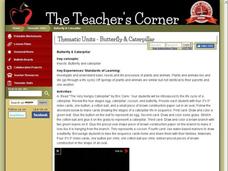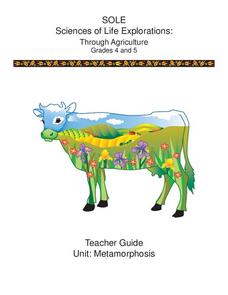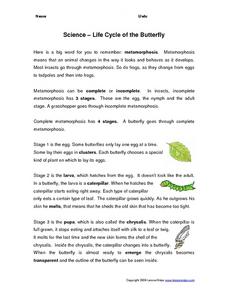Curated OER
Insects and Bugs
Students recognize the difference between insects and bugs while making connections to personal experiences. In this insect and bug lesson, students complete a pre-assessment to demonstrate prior knowledge, then gather information...
Curated OER
Life Cycle
Young scientists explore the world of entomology. They focus on the life cycle of butterflies and moths. They utilize the entire school year in order to see how butterfly eggs turn into the chrysallis, then into a butterfly, who then...
EngageNY
Conducting Research: Analyzing a Variety of Sources to Capture Information about My Insect
From picture to words. Scholars analyze a picture of an ant and then list two facts they observed and any questions that may arise. Expert groups from the previous instructional activity then look at a diagram about either an ant or...
Curated OER
Mealworms
Crawl into the world of the darkling beetle with this scientific investigation. Watch as the insects move through the larval, pupal, and adult stages of life, recording observations along the way. Discuss the necessities of life as young...
PBS
The Caterpillar or Larva
The larval stage of the butterfly life cycle is quite exciting. Start a discussion about the specially designed body parts unique to caterpillars. After examining images of caterpillars, learners use plastic soda bottles, string, and...
Curated OER
The Life Cycle of the Butterfly
Second graders study the life cycle of a butterfly by observing metamorphosis taking place in a butterfly pavilion. Students illustrate their understandings of the body parts of a caterpillar and butterfly, as well as the life cycle,...
Curated OER
Label the Butterfly Life Cycle Diagram
In this science activity, students study the life cycle of a butterfly by first reading the information on the page. Students then label a life cycle diagram and read 4 definitions of important words.
Curated OER
Interesting Insects
In this insects worksheet, students read about insects and then answer the 10 questions pertaining to what they just learned. The answers are on the last page.
Curated OER
Adopt An Insect
This lesson plan combines a creative building activity with analyzing a butterfly photograph and using problem solving to complete the puzzle. It blends art and science very well. Students will learn and enjoy the process. The extension...
Curated OER
Reading "Beetles, Bees and Butterflys"
Reading information about beetles, bees, and butterflies is the focus of this science worksheet. Students apply vocabulary and comprehension skills in order to answer six questions based on the reading.
Curated OER
Insects
Third graders research an insect and creates a brochure on that selected insect. Each student develops a Venn Diagram comparing similarities and differences between moths and butterflies.
Curated OER
Classifying Plants and Insects
Art and science come together in a instructional activity based on Flower Still Life by Ambrosius Bosschaert the Elder. Learners classify plants and insects in the painting by color, leaf shape, size, reproduction, and season of bloom.
Curated OER
A Bug's Life: Diary of an Insect's Metamorphosis
Fifth graders examine the stages of insect's to understand heredity. In this inherited traits lesson, 5th graders explore the life of the honeybee for its inherited traits. Students recognize the difference between inherited traits and...
Curated OER
Butterfly and Caterpillar
Students listen to the story "The Very Hungry Caterpillar" and create their own "Very Hungry Caterpillar" book to learn the life cycle of a butterfly.
Cornell University
Metamorphosis
Looking for an insect unit that addresses multiple skill strategies? Young entomologists explore multiple life cycles of insects that go through metamorphosis. The brainteasers and mobile activity spark learner interest before guiding...
K5 Learning
The Life Cycle
Studying plant, animal, or insect life cycles? Pair a science unit with a reading comprehension worksheet on life cycles. The passage touches briefly on butterfly, plant, frog, and dog life cycles before prompting readers to answer six...
American Museum of Natural History
Draw a Monarch
Five steps walk scholars through the process of drawing a Monarch butterfly. Participants research the insect, make observations, trace, then color.
Curated OER
Parts of an Insect
In this science worksheet students will label the parts of an insect. Students will synthesize a list of insect names for each letter of the alphabet.
Curated OER
The World of Insects and Spiders
Students identify numerous insects and their body parts. In this insect life lesson plan, students practice using scientific vocabulary while comparing the different parts of spiders and insects. Students view several videos discussing...
Curated OER
Body Parts of a Butterfly
Students identify the seven major parts of a butterfly. In this butterfly anatomy lesson, students explore three dimensional models of butterflies and discuss the anatomy. Students view a PowerPoint for the anatomical parts of a...
Curated OER
Life Cycle of Animals: Butterfly, Cockroach, Mosquito
In these life cycle worksheets, learners write true or false for the statements about the life cycles of butterflies, cockroaches, and mosquitoes. Students name 3 examples of animals with life cycles similar to butterflies and...
Curated OER
Butterfly Report
In this biology worksheet, students draw or trace an accurate picture of a butterfly. Then they complete the information related to their butterfly's classification and list the habitats where they are likely to be found. Students also...
Curated OER
The Life Cycle of a Butterfly
For this life cycle of a butterfly worksheet, students answer 7 short answer questions, draw a picture of a butterfly, answer 4 vocabulary questions and fill in 6 fill in the blank statements about butterflies.
Curated OER
Science - Life Cycle of the Butterfly
In this butterfly activity, students learn about the 4 stages that a butterfly goes through during metamorphosis. They then use what they learned to answer the 9 questions on the page. The answers are on the last page of the packet.

























